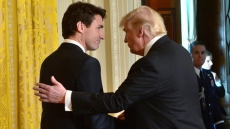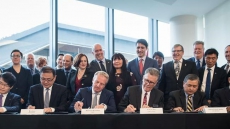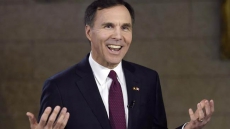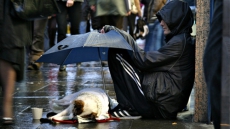VANCOUVER — British Columbians will soon start receiving mailed ballots for a chance to vote in a referendum that could change the provincial voting system, but the experience of other provinces suggests the plan will be a waste of time and money, says a political science professor.
Nelson Wiseman of the University of Toronto said Ontario and Prince Edward Island have failed to replace the existing first-past-the-post system, as has B.C. in two previous attempts, because the status quo favours established parties in the long run.
Wiseman said elected leaders should decide themselves if they want to change a system and not leave that up to voters, who could oust a party in the next election if they're dissatisfied with the results.
"My attitude is, 'Look, don't tell me you're going to have a referendum. Tell me if you are in favour. Are you going to do it or are you not going to do it?' "
Proponents of proportional representation say it's a fairer way of electing candidates because the percentage of votes would roughly equal the number of seats a party gets in the legislature. Opponents say local representation would be reduced with parties having more control.
Vote PR BC and the No BC Proportional Representation Society are the two official proponent and opponent groups in the referendum, and each has received $500,000 in government funding.
British Columbians are receiving voter guides in the mail, and ballot packages will be sent over the next two weeks. The voting period will start Monday, and all ballots must be received by Elections BC by Nov. 30.
The ballot will contain two questions: whether the first-past-the-post system should be kept or changed to a system of proportional representation. The second question involves ranking three proportional systems, which are:
— Mixed-member proportional, or MMP, would result in 60 per cent of members of the legislature being elected by the most votes and 40 per cent by lists set by political parties.
— Dual-member proportional would involve large ridings represented by two politicians, including one with the most votes.
— Rural-urban proportional would be a blend of the MMP for rural ridings and the single transferable vote system for urban ridings, though voters have already rejected it in 2005 and 2009 referendums.
Attorney General David Eby has said that if a proportional representation system is voted in, a second referendum would be held following two general elections to allow for a return to the current system.
Wiseman called that "ridiculous."
"My overall view about this is that you ought not to have referenda on these things. That's what elections are for," he said, adding British Columbia has proposed too many proportional models that are confusing.
However, Prince Edward Island voters will be asked whether they want to ditch the first-past-the-post system in another referendum that's expected next year.
Wiseman said that's not surprising because it allows political parties to suggest that people have power, even if they're voting for systems that may ultimately be unsuccessful.
In B.C., Premier John Horgan, whose New Democrats formed a minority government last year after reaching an agreement with the Green party, is campaigning in favour of proportional representation.
Green Leader Andrew Weaver, who also favours a change, said the first-past-the-post model doesn't allow parties to work together and make compromises.
"If you believe that politics is about power as opposed to good governance then obviously you want ultimate power and you want to have it solely in the hands of a handful of people," he said.
"There's no doubt we would get more seats out of proportional representation."
The BC Liberal party is campaigning against proportional representation.
Andrew Watson, spokesman for Elections BC, said "plain-language experts" were hired in an effort to provide clear information about the referendum options on its website and in mailed-out material.
He said Elections BC also sought advice from an expert in electoral systems from New Zealand, which adopted a form of proportional representation in the 1990s.
Elections BC will start posting information on its site about the number of packages it has received starting Nov. 2, with the results of the referendum to be announced at an undetermined date, Watson said.




